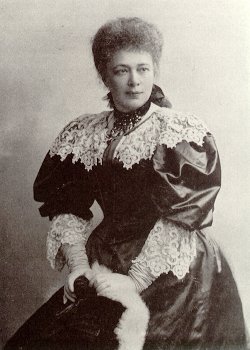Von Suttner and Nobel
Today, the origin of the Nobel Peace Prize. The University of Houston's College of Engineering presents this series about the machines that make our civilization run, and the people whose ingenuity created them.
The first Nobel prizes were given in 1901. They included the Physics Prize to Roentgen who'd discovered X-rays, and the Peace Prize to Dunant who'd founded the Red Cross. Alfred Nobel had made a fortune inventing and selling dynamite and other more powerful explosives. He was shy, indrawn, and torn by feelings of inadequacy. He never married, yet his life was powerfully affected by a woman named Berta Kinsky von Suttner.
 In 1876, the 43-year-old Nobel placed an ad in a Vienna paper: It said, Wealthy, highly educated elderly gentleman seeks lady of mature age, versed in languages, as secretary and supervisor of household. That business about being elderly at 43 says a lot about Nobel.
In 1876, the 43-year-old Nobel placed an ad in a Vienna paper: It said, Wealthy, highly educated elderly gentleman seeks lady of mature age, versed in languages, as secretary and supervisor of household. That business about being elderly at 43 says a lot about Nobel.
Berta Kinsky, a 33-year-old countess who'd fallen on hard times, answered the ad. She'd been in the service of the aristocratic von Suttner family 'til then. But a romance had developed with young Arthur von Suttner. Arthur's parents disapproved of her poverty and asked her to leave. So she went to work for Nobel.
Nobel was smitten by the beautiful and intelligent Kinsky. It wasn't long before he professed his love for her. Berta told him thank you, but she was engaged to Arthur.
Berta and Arthur eloped soon after. Nobel saw her only two more times, but they corresponded as long as he lived. As the Baroness von Suttner, Berta took up the cause of peace. In 1889 she published a book titled Lay Down Your Arms. Only one other 19th-century book was more popular -- Harriet Beecher Stowe's Uncle Tom's Cabin . Berta had touched a nerve. She'd also touched Nobel. He wrote, "I have just finished reading your masterpiece." He also called her, "an Amazon who so valiantly wages war on war."
 In 1892, Berta invited Nobel to join in a Peace Congress she'd organized. He contributed money. He also attended, but he did so incognito. Nobel insisted the best way to end war was to create a weapon so vicious as to make war unthinkable. He kept making munitions and he kept supporting Berta's peace efforts.
In 1892, Berta invited Nobel to join in a Peace Congress she'd organized. He contributed money. He also attended, but he did so incognito. Nobel insisted the best way to end war was to create a weapon so vicious as to make war unthinkable. He kept making munitions and he kept supporting Berta's peace efforts.
Before he died (only four years later) he set up the Nobel Prizes in his will. It was clear they'd include Physics, Chemistry, Medicine, and Literature. As for the Peace Prize, his and Berta's letters argued over its form. Offering it for efforts at disarmament, he felt, would be futile. It should instead reward efforts at arbitration and ending the prejudices that caused war.
When Nobel died, his will was hotly debated. Many people thought the Peace Prize was wasted money -- foolish idealism. But it stood up in court and the Prize has been given ever since.
In 1905, the Peace Prize went to Berta Kinsky von Suttner. She'd done much in her life for the cause of peace, no doubt. But I suspect that we find her finest contribution to peace in the lasting influence of -- the Nobel Peace Prize itself.
I'm John Lienhard, at the University of Houston, where we're interested in the way inventive minds work.
(Theme music)
1. Fant, K., Alfred Nobel: A Biography. New York: Arcade Publishing, 1991.
See also the entries under Suttner, Nobel, and Nobel Prizes in the Encyclopaedia Britannica. I also talk about Nobel in Episode 605, but with more emphasis on his life than on Berta von Suttner's.